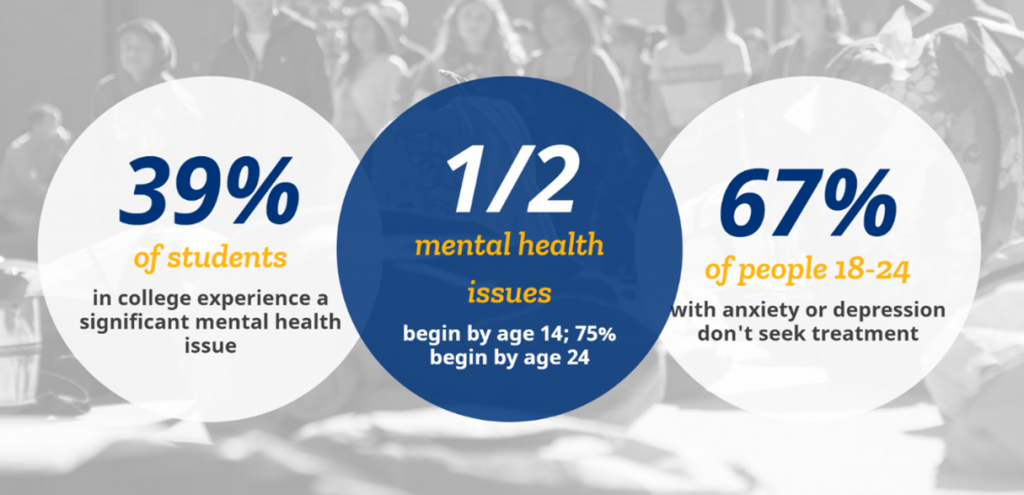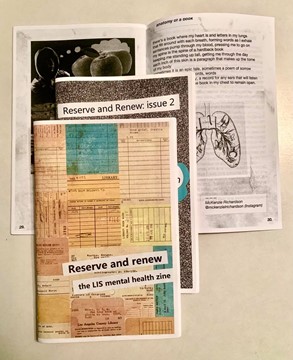Every two years, the ACRL Research Planning and Review Committee publishes in College & Research Libraries News an article on the top trends and issues affecting academic libraries and the change our institutions are experiencing. We will be highlighting some of these trends through a number of blog posts over the next few weeks.
“Academic librarians are natural connectors, guiding their users to not only resources, but also connecting them to people, services, and spaces that can provide assistance” – Ramsey & Aagard, 2018
Endless rows of well-loved books. Physical space, digital resources, and information in droves. Scholarship and intellectual curiosity. These are all concepts readily associated with academic libraries. But what about wellness, mental health and holistic student support? These concepts might not first come to mind, but they are a vital part of academic libraries.
In a recent article in Library Journal, Steven Bell asserts that the opening of academic libraries to the larger local community has pushed mental health concerns to the forefront. His discussion centers around a new trend of employing social workers, who can provide mental health and community resources, in some public libraries. Academic libraries, often serving smaller and more specialized communities, have sometimes been seen in the library community as guarded from these conversations. While, yes, increased community access in academic libraries may increase focus on wellbeing and support, mental health should not be a new concept to any library.

1 in 5 adults (individuals age 18 and older) have a diagnosable mental illness. And 39% of college students experience a significant mental health issue during their time in school (Active Minds Statistics). While these statistics may seem discouraging, they also highlight the idea that no one struggles alone. We all have mental health and academic libraries can emphasize student wellbeing in an exceptional way. Libraries play a key role in providing current, accessible and free information. Information that can help someone dealing with a mental health issue. Additionally, the space and programming provided by libraries can support wellbeing on multiple levels. Students may be struggling with food insecurity, family responsibilities and sleep deprivation in addition to their academics. Moreover, COVID-19 is impacting the wellbeing of students, and everyone, as we cope with constant change and increased health concerns.
So, what exactly is wellbeing?
Merriam Webster defines wellbeing simply as “the state of being happy, healthy, and prosperous.” (Merriam-Webster, n.d.) But the concept goes much further than that. Wellbeing encompasses holistic student support, from traditional academic support to mental health awareness to emphasis on physical care.

The goal of wellbeing is supporting a student with what they struggle with, allowing them to better cope, and ultimately succeed personally as well as professionally (Cox & Brewster, 2020). To some, connecting this idea of wellbeing to a library, may seem somewhat ephemeral. Sure, libraries provide books that provide a sense of joy, right? And depending on where someone is in their massive research project, that might not even be a certainty. But while books are a crux of all libraries, there is much more that libraries do. As community hubs, academic libraries connect students to resources, space and services that support physical, mental, and spiritual health.
Partnership and Programming
Academic libraries can provide a unique synergy when partnering with other university entities and student organizations. Albertsons Library at Boise State frequently partners with their Health Services team allotting space for them to interact with students in a new setting, the library. In a variety of events, the Health Services team brought in nutritionists to interact with students, provided flu shots and tips for stress management (Ramsey & Aagard, 2018). This collaboration between the library and other university organizations can reach new students who may not otherwise utilize university wellbeing services or, conversely, the library. It also allows students to access new resources and for multiple groups, to bring their own expertise to students.
Other examples of wellbeing initiatives include collection development of self-help books, libguides related to wellness and reading recommendations. More innovative, recent trends in programming include therapy-pet sessions, meditation rooms and designated nap spaces in libraries (Ramsey & Aagard, 2018). Worth noting, of course, is that a lot of these initiatives are suited for a pre-COVID 19 world. As libraries around the world shift services, finding new avenues to support wellbeing virtually is important.
Partnership can extend beyond the university community as well. Academic libraries could consider hosting mental health trainings or webinars with local groups, such as Mental Health First Aid or a local National Alliance on Mental Illness (NAMI) chapter. Trainings like these educate students about their own wellbeing while also providing information on assisting others who may need support. Libraries are often perceived as a “safe” place and this environment can spark conversations about mental health that may not otherwise have the space to grow (Cox & Brewster, 2020).
Library Value

The concept of wellbeing must always extend to library staff as well. Reserve and Renew is a zine that aims to open the conversation about mental health in the library field. Printed annually, the zines highlight stories and lived experiences from library and information science students as well as library professionals. In order to support student wellbeing, library staff must consider their wellbeing as being just as valuable.
Whether the library provides a moment of escapism, a needed resource, a place to study, a source of internet access, or even someone to talk to, librarians are here providing those services. As we all navigate through this year, libraries continue to provide services that impact communities in a myriad of ways. Our doors remain open for study space reservation by current students which can provide a space beyond the virtual world we all inhabit, what feels like 24/7. Additionally, University Libraries continue to provide book pick-up services. Our most up-to-date COVID-19 procedures and services can be viewed here, Libraries COVID-19 Information Guide.
Other resources for Catholic University students include the Counseling Center, the Cardinal Cupboard, and additional food resources in DC.
References and Additional Reading
Active Minds (2020). Statistics. https://www.activeminds.org/about-mental-health/statistics/
Bell, S. (2019). “Time for a new position in the academic library?” Library Journal. October 9. https://www.libraryjournal.com/?detailStory=Time-for-New-Position-in-Academic-Library-From-the-Bell-Tower
Cox, A. & Brewster, L. (2020). “Library support for student mental health and well-being in the UK: Before and during the COVID-19 pandemic.” Journal of Academic Librarianship 46 (6). https://doi.org/10.1016/j.acalib.2020.102256
Eberle, M. (2018). “Academic libraries and mental health.” Massachusetts Library System. https://www.masslibsystem.org/blog/2018/11/19/academic-libraries-and-mental-health/
National Alliance on Mental Illness. (2020). https://www.nami.org/home
Mental Health First Aid. (2020). https://www.mentalhealthfirstaid.org
Ramsey, Elizabeth and Aagard, Mary C. (2018) “Academic Libraries as Active Contributors to Student Wellness.” College & Undergraduate Libraries 25 (4): 328–34. https://doi.org/10.1080/10691316.2018.1517433
Reserve and Renew zine. (2020). http://lismentalhealth.org/reserve-and-renew-zine/
